
Caring for seniors is a rewarding role that comes with its unique challenges. One of the most crucial aspects of being a senior caregiver is knowing how to handle emergencies effectively. Emergencies can happen at any time, and having the right skills can make all the difference in ensuring the safety and well-being of your senior loved ones. February is American Heart Month, a reminder to focus on heart health, which is especially important in senior care. Senior Helpers Adrian will guide senior caregivers through essential emergency skills needed to safeguard seniors during unexpected situations.
1. CPR and AED Usage
In cardiac emergencies, time is of the essence. Cardiopulmonary resuscitation (CPR) can be a lifesaver when a senior experiences a heart attack. The basic steps include checking responsiveness, calling for help, and performing chest compressions followed by rescue breaths. An Automated External Defibrillator (AED) helps restore the heart's rhythm. Knowing how to use an AED effectively can significantly increase survival chances in cardiac emergencies.
2. The Heimlich Maneuver
Choking is a common risk among seniors due to difficulty in swallowing. Recognize choking signs, such as difficulty breathing or an inability to speak. The Heimlich maneuver can be a life-saving technique. To perform it, stand behind the choking person, place your arms around their waist, and thrust your fist into their abdomen. This action helps dislodge any obstruction from the airway.
3. Fall Response and Prevention
Falls can lead to serious injuries in seniors. If a senior falls, stay calm and assess for injuries. Avoid moving them unless necessary and call for medical help if needed. To prevent falls, ensure the home is safe by removing tripping hazards, installing grab bars, and improving lighting. Using non-slip mats and ensuring proper footwear can also reduce the risk of falls.
4. Managing Dementia-Related Episodes
Dementia-related agitation can be stressful for both the senior and caregiver. Recognizing signs of agitation or aggression is key. Techniques for managing these episodes include speaking calmly, redirecting attention, and creating a soothing environment. Engaging in simple activities or playing familiar music can help reduce stress and agitation.
5. Recognizing and Responding to Stroke Symptoms
Quick response to stroke symptoms is critical. The FAST acronym can help: F for facial drooping, A for arm weakness, S for speech difficulties, and T for time to call emergency services. If you notice any of these signs, seek immediate medical assistance. Timely intervention can significantly improve outcomes for stroke patients.
6. Basic First Aid for Common Injuries
Minor injuries like cuts, bruises, and burns are part of everyday life. Knowing basic first aid is important. Clean cuts with water, cover them with a bandage, and monitor for infection. Apply cold compresses to bruises and run cool water over burns before covering them. If the injury appears severe or worsens over time, seek medical help right away.
Contact Senior Helpers for Comprehensive Senior Care Services
Having the right emergency skills can help senior caregivers ensure the safety and health of their loved ones. By staying informed and receiving proper training, caregivers can confidently handle challenging situations. If you're looking for professional caregiving services in Adrian, Ann Arbor, Ypsilanti, Jackson, or Hillsdale, contact us at Senior Helpers Adrian. Let us help you provide the best care for your senior loved ones.